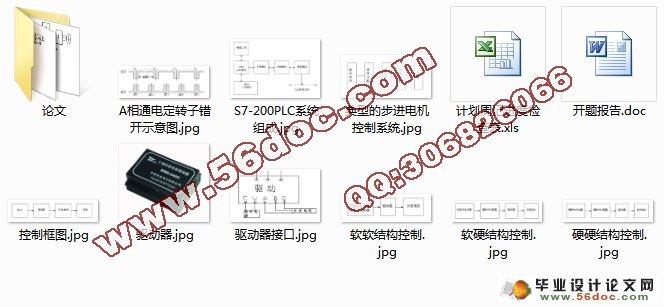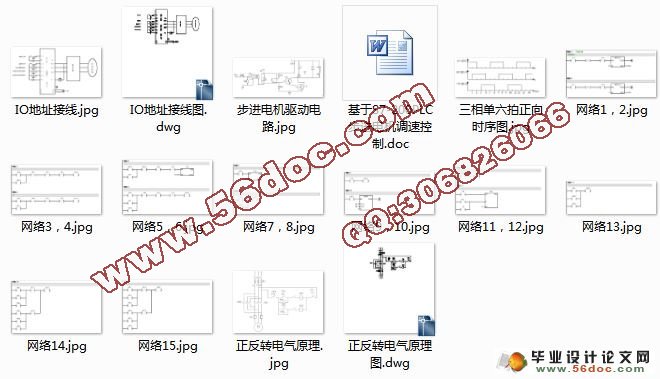基于S7-200PLC步进电机调速控制—步进驱动控制系统设计
无需注册登录,支付后按照提示操作即可获取该资料.
基于S7-200PLC步进电机调速控制—步进驱动控制系统设计(任务书,开题报告,进度检查表,毕业论文20000字)
摘 要
步进电动机具有快速起停、精确步进和定位等特点,所以常用作工业过程控制及仪器仪表,使用PLC可编程控制器实现步进电动机驱动,可使步进电动机的抗干扰能力强,可靠性高,同时,由于实现了模块化结构,是系统结构十分灵活,而且编程语言简短易学,便于掌握,可以进行在线修改,柔性好,体积小,维修方便。
本设计是利用PLC做进电动机的控制核心,用按钮开关的通断来实现对步进电机正,反转控制,而且正,反转切换无须经过停车步骤。其次可以通过对按钮的控制来实现对高,低速度的控制。充分发挥PLC的功能,最大限度地满足被控对象的控制要求,是设计PLC控制系统的首要前提,这也是设计最重要的一条原则。本设计更加便于实现对步进电机的制动化控制。其主要内容如下:
1了解PLC控制步进电机的工作原理
2掌握PLC的硬件构成,完成硬件选型
3设计PLC的控制系统
4用STEP 7完成PLC的编程
关键词:步进电机;PLC控制;电机正反转;高低速控制
Abstract
Stepper motor has a quick starts and stops, precision stepping and positioning features, commonly used for industrial process control and instrumentation, PLC programmable controller stepper motor drive can stepper motor anti-interference ability, high reliability, at the same time, due to the modular structure, the system structure is very flexible, and programming languages brief to learn, easy to master, can be modified online, good flexibility, small size, easy maintenance.
This design is the use of PLC built into the core of the motor control button to switch on and off to the stepper motor is the reverse control, and positive, reverse switch without having to go through the parking step. Followed by the button control to achieve the high and low speed control. Give full play to the functions of PLC as possible to meet the control requirements of the controlled object is the most important prerequisite for the design PLC control system, which is designed to the most important principle. This design is easier to achieve braking control of the stepper motor. Its main contents are as follows:
An understanding of PLC control the working principle of the stepper motor
2 grasp the PLC hardware structure, the completion hardware selection
3 Design of PLC control system
4 complete PLC programming with STEP 7
Key words: Stepper motor; PLC control; motor reversing; high and low speed control
PLC步进驱动控制系统主要研究工作
掌握步进电机的原理及其驱动方法,掌握西门子S7-200 PLC的原理与程序设计方法。掌握步进电机的电气控制试验系统的工作原理,基于该系统设计S7-200 PLC程序,实现PLC对步进电机的调速控制。主要研究工作如下:
(1)了解PLC控制步进电机的工作原理
(2)掌握PLC的硬件构成,完成硬件选型
(3)设计PLC的控制系统
(4)用STEP 7完成PLC的编程


目 录
摘 要 III
ABSTRACT IV
1 绪论 1
1.1 PLC步进驱动控制系统研究和意义 1
1.2 国内外PLC的发展 1
1.3 国内外步进电机的发展概况 2
1.4 PLC步进驱动控制系统主要研究工作 3
2 步进电机及PLC简介 4
2.1 步进电机简介 4
2.1.1 步进电机的分类 4
2.1.2 步进电机的基本参数 4
2.1.3 步进电机的特点 5
2.2 步进电机在工业中的应用 5
2.3 PLC的特点 6
2.4 PLC技术在步进电机控制中的应用 6
3 PLC控制步进电机工作方式的选择 8
3.1 常见的步进电机的工作方式 8
3.2 步进电机控制原理 8
3.2.1 控制步进电机换向顺序 8
3.2.2 控制步进电机的转向 8
3.2.3 控制步进电机的速度 8
3.3 PLC控制步进电机的方法 9
3.4 PLC控制步进电机的设计思路 10
4 S7-200PLC控制步进电机硬件设计 12
4.1 S7-200PLC的介绍 12
4.1.1 硬件系统 12
4.1.2 软元件 13
4.2 步进电机的选择 14
4.3 步进电机驱动电路设计 15
4.3.1 驱动器的选择 15
4.3.2 步进电机驱动电路 16
4.3.3 驱动电路接口 16
4.3.4 电气原理图 17
4.4 PLC驱动步进电机 17
5 S7-200PLC控制步进电机软件设计 19
5.1 STEP7-MICRO/WIN32概述 19
5.1.1 基本功能 19
5.1.2 运动控制 19
5.1.3 创建调制解调模块程序 19
5.2 程序的编写 21
5.3 梯形图程序设计 22
5.3.1 CPU的选择 22
5.3.2 输入输出编址 22
5.3.3 状态真值表 22
5.4 梯形图程序 23
6 总结 30
6.1 全文总结 30
6.2 不足之处及展望 30
致谢 31
参考文献 32
